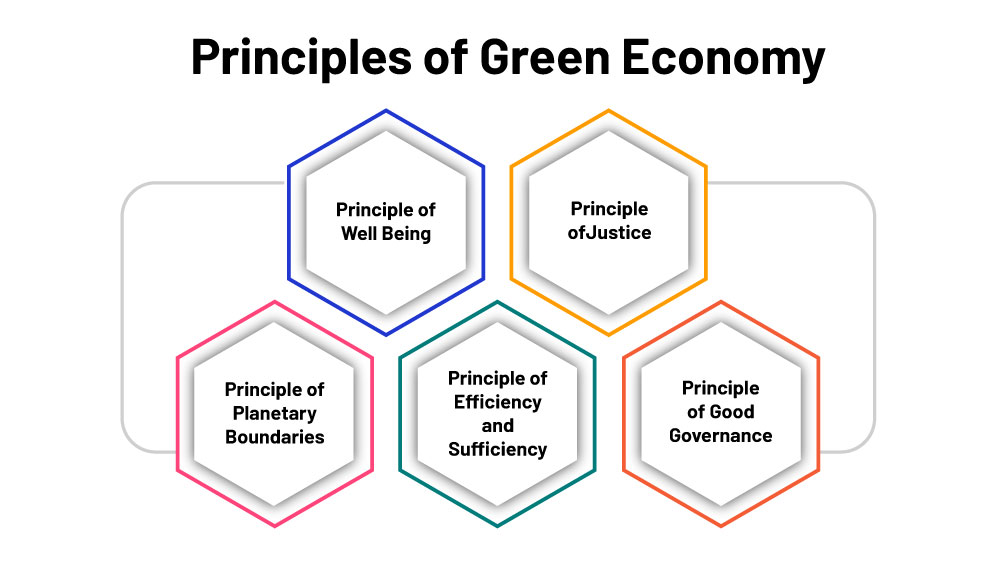In 2005, India’s National Rural Employment Guarantee Act (NREGA) was set up by the Ministry of Rural Development as a wage employment programme meant specifically for rural households. With this, a minimum livelihood is guaranteed. Not only does the Act contribute towards inclusivity and growth of women and marginalised communities in rural India, but it also focuses on afforestation, water conservation, and other ecologically sound initiatives. This is a classic example of what is known as the ‘Green Economy’.
To understand the idea of a green economy, let us first take a look at what an economy is. It is an interconnected system of production and consumption patterns, which, in turn, determines the distribution of a limited number of resources that are available. Economies can be specific to a country or region, an industry or business sector, or even a community. In fact, the word economy itself comes from the Greek word for household management. Although the idea of the economy has mainly to do with money, trade, labour, the market and employment, of late, other factors have been coming into play. There is now an emphasis on “economic growth and environmental responsibility working together in a mutually reinforcing fashion while supporting progress and social development," as per the International Chamber of Commerce. That, in a nutshell, is what the green economy is all about.
According to the United Nations Environment Programme, a green economy is defined as “low carbon, resource efficient and socially inclusive. In a green economy, growth in employment and income are driven by public and private investment into such economic activities, infrastructure, and assets that allow reduced carbon emissions and pollution, enhanced energy and resource efficiency, and prevention of the loss of biodiversity and ecosystem services.”

The Green Economy is based on five principles:
The Wellbeing Principle: “In a green economy, people do not just focus on their wealth, but also various other aspects,” says Dr Guhan Kanappan, a former professor of development economics. “The emphasis is on their health, happiness, and development in all other spheres. Individuals are at the forefront of this principle that prioritises access to physical well-being, knowledge, personal growth, and satisfaction. If you are lacking in all these aspects, wealth may as well take a backseat.”
The Justice Principle: Native American tribes purportedly believe in the proverb, “We do not inherit the earth from our ancestors, we borrow it from our children.” Dr Kannapan says, “There is an emphasis on human rights, and communities are at the forefront of this principle of green economy. The idea is to promote an equal and equitable future. Imagine this -- a short person, a person with moderate height, and a tall person are trying to peep over a wall. If all of them were given a stool of the same size, it would be considered an equal world. But it still wouldn’t be an equitable world, because they don’t have the necessary tools where all of them can reach the same level. Similarly, a green economy shifts its focus onto women, on those who are marginalised, and even promotes equity between generations. Those who live today and those who live tomorrow should be able to have the same opportunities.”
The Planetary Boundaries Principle: “The concept of planetary boundaries was introduced to define safe environmental limits within which humans can pursue their life and goals,” says V Netra Reddy, who is pursuing her PhD in Ecology and Environmental Science. “In just over a century, the stable planet that our ancestors occupied has suddenly undergone a transformation, because the way humanity operates has changed. Among the primary concerns that plague us are climate change, the erosion of the ozone layer, loss of biodiversity, ocean acidification, chemical pollution, freshwater consumption, land system change, and so on. Addressing these issues involves establishing safe levels for the depletion of key natural resources – both at the global level as well as the regional level. Only once this is established can this key principle of the green economy come into play.”
Efficiency & Sufficiency Principle: In 2021, Mission LiFE was launched by the Prime Minister of India in the presence of UN Secretary-General, Antonio Gutteres. With the tagline ‘lifestyle for environment’, the initiative works towards a low-carbon, sustainable lifestyle. It is meant to mobilise everyone, right from individuals to industries and markets. For instance, renewable energy capacity has increased by 290 per cent in just under a decade. The National Hydrogen Mission also focuses on an alternative energy source that is environmentally friendly. There are various other schemes and initiatives that have been launched, both in India and globally, to promote the Efficiency and Sufficiency Principle, which is all about responsible production and consumption, rather than mindless consumerism and marketing.
Good Governance Principle: Democratic accountability is perhaps the most important pillar of a green economy. Institutions – across sectors as well as at the government level -- need to be both inclusive and integrated. There has to be transparency in decisions and policies, backed by social dialogue and public participation. This is when good governance becomes a real possibility. Enlightened leaders can enable systems to be put into place, which comply with the needs of the people and community. With initiatives that are designed to first serve the financial wellbeing and interest of society, good governance can be the make-or-break factor in implementing a green economy successfully.
Is the green economy similar to the circular economy? Not quite. The former adopts a multi-pronged approach to ensure that environmental, social, and developmental goals are met. The latter, on the other hand, puts the spotlight on the restoration of discarded products that add to landfills and responsible manufacturing processes to reduce product wastage. Essentially, though, they are both linked to one another in the sense that they advocate stopping mindless production and consumption.
After all, as scientist, Professor Guy MacPherson said, “If you think the economy is more important than the environment, try holding your breath while you count your money!”